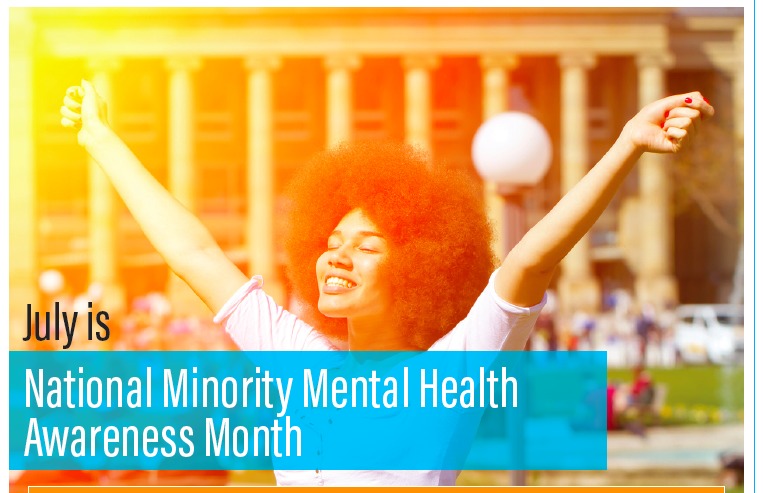
JULY IS NATIONAL MINORITY MENTAL HEALTH AWARENESS MONTH
In 2008, the US House of Representatives designated July as Bebe Moore Campbell National Minority Mental Health Awareness Month, which is now known as National Minority Mental Health Awareness Month. The resolution was sponsored by Rep. Albert Wynn [D-MD] and cosponsored by a large bipartisan group to achieve two goals:
- Improve access to mental health treatment and services and promote public awareness of mental illness.
- Name a month as the Bebe Moore Campbell National Minority Mental Health Awareness Month to enhance public awareness of mental illness and mental illness among minorities.
As part of this effort, The HHS Office of Minority Health joins partners at the federal, state, local, tribal, and territorial levels to help raise awareness about mental illness and its effects on racial and ethnic minority populations.
According to the Substance Abuse and Mental Health Services Administration (SAMHSA):
- In 2017, 41.5% of youth ages 12-17 received care for a major depressive episode, but only 35.1% of black youth and 32.7% of Hispanic youth received treatment for their condition.
- Asian American adults were less likely to use mental health services than any other racial/ethnic group.
- In 2017, 13.3% of youth ages 12-17 had at least one depressive episode, but that number was higher among American Indian and Alaska Native youth at 16.3% and among Hispanic youth at 13.8%.
- In 2017, 18.9% of adults (46.6 million people) had a mental illness. That rate was higher among people of two or more races at 28.6%, non-Hispanic whites at 20.4% and Native Hawaiian and Pacific Islanders at 19.4%.
The Agency for Healthcare Research and Quality (AHRQ) reports that “racial and ethnic minority groups in the U.S. are less likely to have access to mental health services, less likely to use community mental health services, more likely to use emergency departments, and more likely to receive lower quality care. Poor mental health care access and quality contribute to poor mental health outcomes, including suicide, among racial and ethnic minority populations.”
OTHER NEWS
THE ZIKA VIRUS AND YOU: WHAT YOU NEED TO KNOW
The Zika virus was first discovered in 1947 and is named after the Zika Forest in Uganda. It is primarily spread to people through the bite of infected Aedes mosquitoes. It can also be transmitted from a pregnant mother to her baby during pregnancy, and it can be sexually transmitted by a man to his partners. While most people who contract the virus have very mild or no symptoms, the Centers for Disease Control and Prevention (CDC) has established a link between Zika infection during pregnancy and serious birth defects and other poor pregnancy outcomes.
PORTRAIT OF HARRIET TUBMAN TO GRACE NEW $20 BILL
Harriet Tubman, a former slave, and abolitionist who, as a “conductor” on the Underground Railroad helped hundreds of African-Americans escape slavery, will replace former U.S. President Andrew Jackson on the face of the $20 bill. The makeover was announced by U.S. Treasury Secretary, Jacob J. Lew.
BWA BOARD MEMBER GINA ADAMS HAILED AS ONE OF THE “10 MOST COMPELLING WOMEN IN WASHINGTON NOW”
Gina Adams, senior vice president government affairs, FedEx Corporation and a member of The Black Women’s Agenda, Inc.’s (BWA) Board of Directors was recently featured as one of the “10 Most Compelling Women in Washington Now,” in Elle magazine.
© 2025 The Black Women’s Agenda, Inc. All Rights Reserved. Privacy Policy





